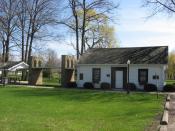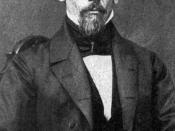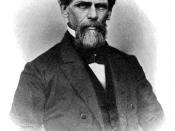John Augustus Roebling
Born on June 12, 1806, in Muhlhausen, Thuringia, Prussia, now Germany,he was the youngest son of Christoph Polycarpus Roebling and Friederike Dorothea (Mueller). At an early age he was educated in the public schools of Muhlhausen and the city Gymnasium, and was also tutored privately to qualify him for entrance to the Royal Polytechnic School at Berlin. While in school he developed an interest in both metaphysics and in bridge building. At the Institute his course included architecture and engineering, bridge construction, hydraulics, languages, and philosophy. He was a pupil of the great Hegel, where the philosopher Hegel once told him that America was "a land of hope for all who are wearied of the historic armory of old Europe". Roebling liked the sound of that. In 1826 he graduated with a degree in civil engineering. Upon his graduation, he was obliged to spent three years as superintendent of public works in Westphalia.
In 1831 he emigrated to the United States, and settled in the area of Pittsburgh, Pennsylvania. He purchased a tract of wild land, and several years devoted himself to reclaiming it, and building up a small country town, which he would call Saxonburg. After marrying and settling in Western Pennsylvania, his wife Johanna gave birth to nine children and he dedicated his energies to farming. The life of a farmer was rather boring to the one who was educated as an engineer, and when the first opportunity came which offered the pursuits of his profession, John became an engineer on the Beaver River and the upper Allegheny River. A work intended to connect the waters of Lake Erie with the Ohio River however, it was never completed due to the lack of means, and the opposing influence of the rising era of the railways.


